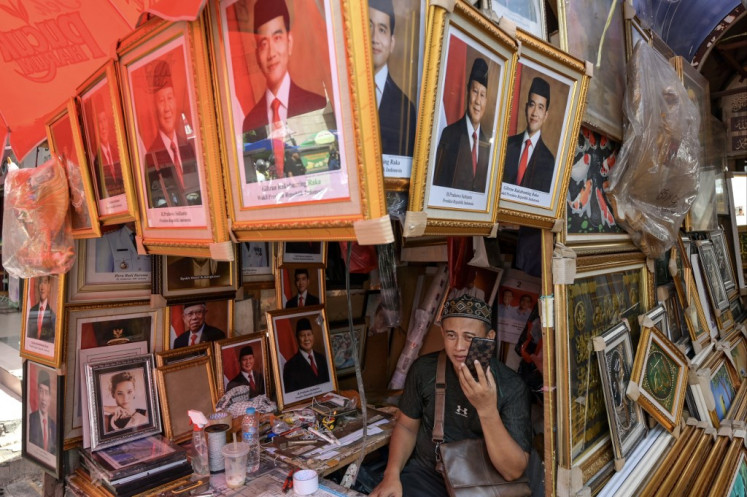Business should lead war against slavery
According to the 2016 Global Slavery Index, more than 736,000 Indonesians are enslaved, mostly in the construction and agriculture sectors.
Change Size
 Workers are involved in the construction of apartments on Jl. Margonda, Depok, West Java on May 16.
(Antara/ Indrianto Eko Suwarso)
Workers are involved in the construction of apartments on Jl. Margonda, Depok, West Java on May 16.
(Antara/ Indrianto Eko Suwarso)
A
s business leaders gather in New York this week to discuss tackling the scourge of modern slavery, they could do well to follow the example set by the Indo-Pacific, led by Australia and Indonesia.
Our two nations have achieved something remarkable in the fight against this horrific human rights injustice. Indeed, we have set an incredible legislative benchmark for the rest of the world’s business and political leaders to meet.
In the first collaboration of its kind, Australia and Indonesia took the lead in the Bali Process Government and Business Forum. This culminated in an historic endorsement by companies from across the 45 member countries in support of the adoption of model law – Indo-Pacific Modern Slavery Acts - aimed at preventing and eradicating modern slavery in global supply chains.
Business leaders showed unwavering support to have these laws implemented consistently across our region in the fight against our greatest humanitarian crisis.
The key feature of the Acts would be to require mandatory reporting requirements, forcing companies to detail what they are doing to eradicate modern slavery from their supply chains. The business leaders also agreed legislation was needed for ethical recruitment to protect at-risk workers and end the immoral practice of would-be employees paying upfront fees to recruitment agencies.
To drive the success of these laws in each country, independent commissioners would be appointed. These commissioners would provide important support to business to encourage them to confidently look, find and report on any slavery found in their supply chains. As an incentive for corporates that adhere to these laws, there will be an anti-slavery certification that rewards them for responsible business practices. If enacted, these laws will impact on the lives of 30 million people in the Indo Pacific alone.
Businesses operating across different jurisdictions in the region would only be required to report once. A standard reporting framework has been designed to ensure ease of communication between suppliers and reduce reporting burdens for companies.
Major Indo-Pacific companies such as JD.com, Adidas, Walmart and Thai Union were among the first to commit to the new legislative road map to end modern slavery. This truly is a momentous step in the fight against this horrendous attack on humanity, but if governments and businesses are to fully adopt this four-point work plan, we must all accept responsibility for what is happening under our noses.
According to the 2016 Global Slavery Index, more than 736,000 Indonesians are enslaved, mostly in the construction and agriculture sectors. In Australia, as many as 4,300 people may also be enslaved, showing that no country is immune from this scourge. The vast and inter-connected economies which underscores our two nations provides us with competitive advantages. However, if corruption and disunity between leaders is left unresolved, criminal activities will continue.
The scale of this issue demands a regional solution. Government support is instrumental but, ultimately, it is the responsibility of business leaders to ensure their supply-chains are free of human exploitation. Among some of the insights shared at the forum, companies that are found to exploit workers, either intentionally or unintentionally, are exposing themselves to reputational risks which could deter shareholders and, as is the case in the United Kingdom, potential criminal sanctions.
Business leaders are also aware of the opportunities associated with ethical business practices in the form of preferential selection by suppliers and access to socially driven markets, providing a significant business incentive. Although there is a substantial business case supporting anti-slavery initiatives, it is mostly a moral one. We simply cannot live in a world where people are treated worse than farm animals.
Australia and Indonesia have worked together for more than a decade to improve the lives of modern slavery victims. Now we are tackling the issue at its source with a commitment to a common set of laws recognized by both government and business leaders.
For our new private-partnership to prosper, we must all commit to these new common laws. This includes the public, who we ultimately serve; the responsibility also rests on you to provide the critical eye for this partnership to remain on course.
***
The writers are Business Co Chairs, Bali Process Government and Business Forum.
---------------
We are looking for information, opinions, and in-depth analysis from experts or scholars in a variety of fields. We choose articles based on facts or opinions about general news, as well as quality analysis and commentary about Indonesia or international events. Send your piece to academia@jakpost.com.









